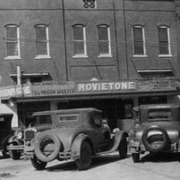Steamboat Bill, Jr.
Video Item Preview
Share or Embed This Item
- Publication date
- 1928
- Usage
- Public Domain


- Topics
- Silent, Comedy, Buster Keaton
- Publisher
- United Artists
Steamboat Bill, Jr. is the story of a naive, college-educated dandy who must prove himself to his working-class father, a hot-headed riverboat captain, while courting the daughter of his father's rival, who threatens to put Steamboat Bill, Sr. and his paddle-wheeler out of business.
- Contact Information
- www.k-otic.com
- Addeddate
- 2005-09-29 03:12:07
- Color
- black & white
- Director
- Charles Reisner, Buster Keaton
- Identifier
- SteamboatBillJr
- Run time
- 69 min
- Sound
- silent with musical score
- Type
- MovingImage
comment
Reviews
Reviewer:
Kerry1960
-
-
July 8, 2021
Subject: Answer to copyright status questions
Subject: Answer to copyright status questions
https://www.busterkeaton.org/copyright-home
You can download a .pdf file with all the info from the site above.
You can download a .pdf file with all the info from the site above.
Reviewer:
ninuzzo
-
favoritefavoritefavoritefavoritefavorite -
January 1, 2012
Subject: Better be silent
Subject: Better be silent
Poetic, hilarious, spectacular, romantic. Why don't they make more movies like this? Finest art only need a little words.
Comparing this masterpiece to today's Hollywood movies, full of chatty people and poor of contents, I can't refrain from asking myself: isn't cinema regrettably in decline?
Comparing this masterpiece to today's Hollywood movies, full of chatty people and poor of contents, I can't refrain from asking myself: isn't cinema regrettably in decline?
Reviewer:
davidbpearson1927
-
-
October 22, 2011
Subject: The music for this film is copyrighted.
Subject: The music for this film is copyrighted.
The music for this film is copyrighted.
Reviewer:
pickford82
-
favoritefavoritefavoritefavoritefavorite -
September 13, 2009
Subject: Very good, although a bit gloomy
Subject: Very good, although a bit gloomy
A lot has been said and written about this movie, so I won't reiterate the plot or analyze it. I'll just say I enjoy it very much because of its awesome slapstick and incredible stunts. Buster is very handsome and the girl here is very cute and funny. I like this music score 'cos it's a lot more cheerful than in the version I had on DVD. There it was kind of odd (that banjo and percussion part) and very dismal. That piece of music that played during the wonderful hat & jail scenes was completely out-there, it almost ruined all the fun! So I highly recommend this very version.
There is a fun page on this film here: http://www.silentsaregolden.com/featurefolder6/SBJpage.html, you might find it interesting!
There is a fun page on this film here: http://www.silentsaregolden.com/featurefolder6/SBJpage.html, you might find it interesting!
Reviewer:
Freddie Jaye
-
favoritefavoritefavoritefavoritefavorite -
July 20, 2008
Subject: So it's not "the General"...
Subject: So it's not "the General"...
...I still give it five stars for its sheer entertainment value. Plenty of slapstick, insanely dangerous stunts, and a plot that doesn't let up for a minute.
I saw this film recently as part of a neighborhood art-cinema's 80th anniversary celebration (sponsored in part by Ben Stiller and Christine Taylor [hometown girl makes good].
Admission was just a nickel, and management was able to show an original print. Live accompaniment was on a spectacular theater organ.
It was a real tribute to Buster's genius, to see an audience ranging from grayhairs to teenagers laughing and cheering throughout the showing.
HAIL KEATON!
I saw this film recently as part of a neighborhood art-cinema's 80th anniversary celebration (sponsored in part by Ben Stiller and Christine Taylor [hometown girl makes good].
Admission was just a nickel, and management was able to show an original print. Live accompaniment was on a spectacular theater organ.
It was a real tribute to Buster's genius, to see an audience ranging from grayhairs to teenagers laughing and cheering throughout the showing.
HAIL KEATON!
Reviewer:
Cat Lady
-
favoritefavoritefavoritefavorite -
July 19, 2008
Subject: Bittersweet fun
Subject: Bittersweet fun
Some of Buster's best physical comedy is in this picture, but knowing what was happening to his career at this point makes it poignant in several spots, most notably the hat scene, and especially where he pushes away his own trademark pork pie hat before his father spots it.
He wouldn't wear his pork pie hat in this film. That says something. I don't really understand why it's said that Buster had much control over "Steamboat," since Mr. Schenck had the copyright, and they had to go along with the plot change from a flood to a cyclone even though they already had just about everything prepared to do flood scenes. It must have cost a lot to redo all that.
There's an interesting contrast with Buster's earlier "Playhouse" in this movie when he gets blown into a theater. Instead of him controlling everything, as he did self-mockingly in "Playhouse," in the theater in "Steamboat" he is totally out of control, carried from one illusion to another only to have it collapse around him.
The collapsing set scene where he first tries to swim in a "lake" not only duplicates a similar scene in "Playhouse," it also is slightly reminiscent of the 'outtake' scenes in the dream movie Buster walks into in "Sherlock, Jr."; but again, there is no attempt made at precision. Buster just staggers through and the sets just collapse one after another as the wind blows on and on and on.
This was definitely not a pleasant time in Buster's life, and it shows in his physical appearance, the risks he took (the collapsing wall scene), and in some parts of this movie.
I interpret the scene in the "Steamboat" theater where Buster first shows us the illusion of him disappearing behind a curtain and then shows us how it was done (which is a big no-no in show business) perhaps as rebellion, but also perhaps as an attempt to try to capture on film some of the chaos in his life and the dreams he had had that were all just turning out to be clever tricks.
But it's very brief and there are still plenty of illusions and thrills and moments of laughter in "Steamboat," which is basically a new twist on the 'Romeo and Juliet' story.
As mentioned, some of Keaton's best falls are in this movie. I loved the plank between the boats scene, too. That whole sequence was pretty good. It's easy to forget that this wasn't a stage: this was a real boat and he was really doing all this stuff on it.
The ending is one of the most physically strenuous ones I've seen in a Keaton film. It's pretty good. Even though "Steamboat" was distributed by United Artists, it's probably not a good idea to even think about comparing Keaton and Douglas Fairbanks (apples and oranges); and yet I can't help noticing that seven years earlier, in "The Three Musketeers," Fairbanks had used a dummy for most of the physical scenes where he is carrying a woman over rooftops; in "Steamboat," in a much more difficult scene, Keaton works throughout with a "live" companion, the very plucky and athletic Marion Byron. Not to make too much of it, but it's an interesting comparison. Perhaps Fairbanks was the smarter one, to make things as easy as possible on himself; but Buster Keaton came from a whole different place, and the key to his success was to avoid getting hurt, of course, but to never take the easy way out because the audience would spot it as a fake.
Keaton just couldn't have gotten away with a dummy in that scene, as Fairbanks did in his.
My favorite "Steamboat" scene is when Buster has the bread loaf with tools in it that he's trying to smuggle in to his incarcerated father and he does a pantomime while singing "The Prisoner's Song."
There is an eloquent camera shot that frames Buster and the girl out in the street as Buster's dad is hauled into jail. Buster doesn't know she's there, and she's mad at him and trying to give him the cold shoulder: then they both see Buster's father going into the jail. Well, it's an extended shot, but it is just so emotionally powerful, and yet gently humorous, too.
Should they have kept the flood in? I was reading up recently on the Great Mississippi Flood of 1927. It was bad, but a sense comes from it that people just forgot their troubles and helped each other out, 9 times out of 10. Sure disasters bring out the worst in people, too, but if you go back through and read the eyewitness accounts and the old news clippings, you can see it.
*****************SPOILER ALERT*******************
Since "Steamboat" ends in much the same way, with old enemies helping each other, it probably would have been best to keep the flood in: everybody would have related their flood experiences to this anyway.
I took a star off just because it is bittersweet, marred by outside interference, but not too much.
He wouldn't wear his pork pie hat in this film. That says something. I don't really understand why it's said that Buster had much control over "Steamboat," since Mr. Schenck had the copyright, and they had to go along with the plot change from a flood to a cyclone even though they already had just about everything prepared to do flood scenes. It must have cost a lot to redo all that.
There's an interesting contrast with Buster's earlier "Playhouse" in this movie when he gets blown into a theater. Instead of him controlling everything, as he did self-mockingly in "Playhouse," in the theater in "Steamboat" he is totally out of control, carried from one illusion to another only to have it collapse around him.
The collapsing set scene where he first tries to swim in a "lake" not only duplicates a similar scene in "Playhouse," it also is slightly reminiscent of the 'outtake' scenes in the dream movie Buster walks into in "Sherlock, Jr."; but again, there is no attempt made at precision. Buster just staggers through and the sets just collapse one after another as the wind blows on and on and on.
This was definitely not a pleasant time in Buster's life, and it shows in his physical appearance, the risks he took (the collapsing wall scene), and in some parts of this movie.
I interpret the scene in the "Steamboat" theater where Buster first shows us the illusion of him disappearing behind a curtain and then shows us how it was done (which is a big no-no in show business) perhaps as rebellion, but also perhaps as an attempt to try to capture on film some of the chaos in his life and the dreams he had had that were all just turning out to be clever tricks.
But it's very brief and there are still plenty of illusions and thrills and moments of laughter in "Steamboat," which is basically a new twist on the 'Romeo and Juliet' story.
As mentioned, some of Keaton's best falls are in this movie. I loved the plank between the boats scene, too. That whole sequence was pretty good. It's easy to forget that this wasn't a stage: this was a real boat and he was really doing all this stuff on it.
The ending is one of the most physically strenuous ones I've seen in a Keaton film. It's pretty good. Even though "Steamboat" was distributed by United Artists, it's probably not a good idea to even think about comparing Keaton and Douglas Fairbanks (apples and oranges); and yet I can't help noticing that seven years earlier, in "The Three Musketeers," Fairbanks had used a dummy for most of the physical scenes where he is carrying a woman over rooftops; in "Steamboat," in a much more difficult scene, Keaton works throughout with a "live" companion, the very plucky and athletic Marion Byron. Not to make too much of it, but it's an interesting comparison. Perhaps Fairbanks was the smarter one, to make things as easy as possible on himself; but Buster Keaton came from a whole different place, and the key to his success was to avoid getting hurt, of course, but to never take the easy way out because the audience would spot it as a fake.
Keaton just couldn't have gotten away with a dummy in that scene, as Fairbanks did in his.
My favorite "Steamboat" scene is when Buster has the bread loaf with tools in it that he's trying to smuggle in to his incarcerated father and he does a pantomime while singing "The Prisoner's Song."
There is an eloquent camera shot that frames Buster and the girl out in the street as Buster's dad is hauled into jail. Buster doesn't know she's there, and she's mad at him and trying to give him the cold shoulder: then they both see Buster's father going into the jail. Well, it's an extended shot, but it is just so emotionally powerful, and yet gently humorous, too.
Should they have kept the flood in? I was reading up recently on the Great Mississippi Flood of 1927. It was bad, but a sense comes from it that people just forgot their troubles and helped each other out, 9 times out of 10. Sure disasters bring out the worst in people, too, but if you go back through and read the eyewitness accounts and the old news clippings, you can see it.
*****************SPOILER ALERT*******************
Since "Steamboat" ends in much the same way, with old enemies helping each other, it probably would have been best to keep the flood in: everybody would have related their flood experiences to this anyway.
I took a star off just because it is bittersweet, marred by outside interference, but not too much.
Reviewer:
aplester
-
favoritefavoritefavoritefavoritefavorite -
October 23, 2007
Subject: New music created for the movie
Subject: New music created for the movie
http://www.dimeadozen.org/torrents-details.php?id=167380
Kenosha Kid's Dan Nettles has written a score to Buster Keaton's silent film Steamboat Bill Jr. Here the band performs it live to a screening of the film at Cine.
To hear the music in its intended setting, burn the audio files to a CD or arrange in a playlist. Grab the DVD from Netflix or your local video store, and start Track 2 when the opening credits begin. You can also stream the movie here, just turn down the original audio.
Kenosha Kid's Dan Nettles has written a score to Buster Keaton's silent film Steamboat Bill Jr. Here the band performs it live to a screening of the film at Cine.
To hear the music in its intended setting, burn the audio files to a CD or arrange in a playlist. Grab the DVD from Netflix or your local video store, and start Track 2 when the opening credits begin. You can also stream the movie here, just turn down the original audio.
Reviewer:
paolocchio
-
-
April 25, 2007
Subject: unable to connect
Subject: unable to connect
I'd like to download the mpeg2 file, but I can't connect to the FTP server.
Is there anyone who experienced the same problem?
Is there anyone who experienced the same problem?
Reviewer:
op712
-
favoritefavoritefavoritefavoritefavorite -
March 22, 2006
Subject: Last great movie for the "stoneface"
Subject: Last great movie for the "stoneface"
1927 - the last year that Buster Keaton produced film as an independent. The next year, Keaton signed with FOX and his life never recovered. "Steamboat Bill JR" testifies of his unique independent quality along with the special effects and storyline. I have the LaserDisc copy of this that was restored in the tinted sequences and original piano score music theme.
Reviewer:
Bent Forkman
-
favoritefavoritefavoritefavoritefavorite -
November 28, 2005
Subject: What a film should be.
Subject: What a film should be.
This is one of my all time favorite films. Watch how class war is cleverly and inobtrusively woven into the story. Particularly beuatiful is the sequence in which Keaton lies on the plank between the boats.
Famous for the hurricane squence at the climax which is among the finest moments in film comedy period.
Famous for the hurricane squence at the climax which is among the finest moments in film comedy period.
79,335 Views
87 Favorites
DOWNLOAD OPTIONS
IN COLLECTIONS
Silent Films Comedy Films
Comedy Films  Feature Films
Feature Films  Movies
Movies 
Uploaded by k-otic on
 Live Music Archive
Live Music Archive Librivox Free Audio
Librivox Free Audio Metropolitan Museum
Metropolitan Museum Cleveland Museum of Art
Cleveland Museum of Art Internet Arcade
Internet Arcade Console Living Room
Console Living Room Books to Borrow
Books to Borrow Open Library
Open Library TV News
TV News Understanding 9/11
Understanding 9/11